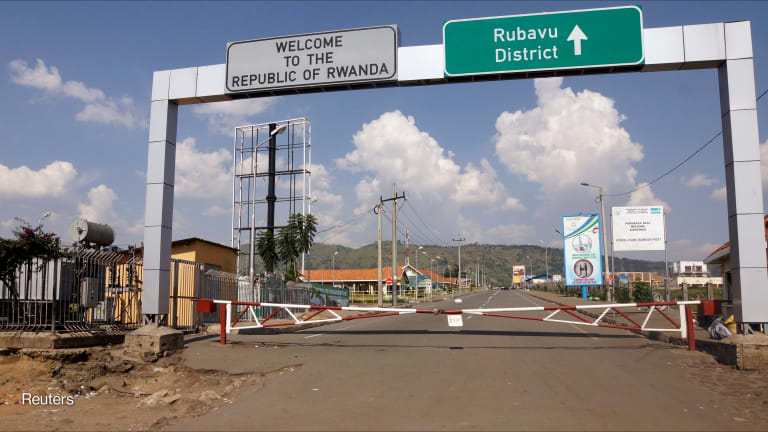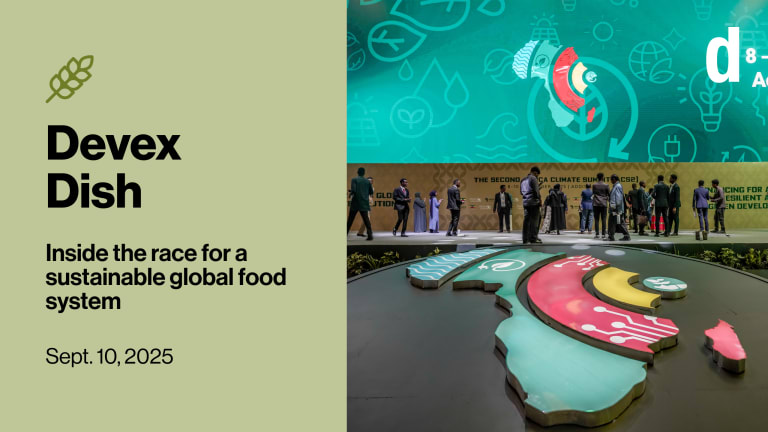
ADDIS ABABA, Ethiopia — The 32nd African Union summit opened at the AU headquarters in Addis Ababa, Ethiopia, on Sunday, with a ceremony that focused on peace and security, migration, and economic growth.
The two-day assembly of 55 heads of state and government will establish the union’s priorities and outline its work program for 2019. The agenda addresses institutional reform, progress on the African Continental Free Trade Area, and updates on peace and security — alongside closed sessions concerning violent extremism, corruption, early marriage, and the adoption of continental legal instruments, open only to specific delegations.
“The agenda for this summit reflects [the] capacity of our union to address an increasingly complex range of challenges and priorities, [which] requires an organization that is agile, healthy and effective,” Rwandan President and outgoing AU Chairperson Paul Kagame said. “What remains is to pass the baton” to the incoming chair, Egypt’s President Abdel-Fattah el-Sissi, he added.
The future of the global economy is digital, Kagame reminded an audience estimated at 2,000. “At this summit, we will consider guidelines for a common African approach to digital identity management ... to increase economic inclusivity and trust for our citizens, particularly in the context of growing regional integration,” he said.
Kagame encouraged leaders to work alongside regional organizations and the private sector to prepare youth for the “technologies that are reshaping global commerce,” such as artificial intelligence, robotics, data mining, and cybersecurity.
Sisi used his opening speech as AU chair to express plans to continue the institutional, structural, and financial reforms introduced by Kagame.
He asserted the importance of developing local solutions to African problems, saying that “Africa is more capable of understanding the complications of its problems and the nature of its conditions, and therefore can find realistic solutions that protect and achieve the interests of its people.”
Efforts to control violence and “silence the guns” by 2020 — an AU ambition — will be difficult, he argued, but Africa must turn its back on disputes that have stunted regional growth.
"It is necessary to support development to tackle the roots of crises [and] therefore I call on the African leaders to work together to revive and activate our continental framework policy to encourage future reconstruction and development, and to draw up plans of action that protect countries that had disputes against any relapse,” Sisi said.
Regarding the African Union’s 2019 focus on the rights of refugees and sustainable solutions to forced displacement, United Nations Secretary-General António Guterres applauded Africa for setting “the gold standard of solidarity,” and encouraged more peace-enforcing missions to decrease the 5.5 million internally displaced people and the more than 18 million refugees and migrants in sub-Saharan Africa.
“Despite the continent’s own social, economic, and security challenges, Africa’s governments and people have kept borders, doors, and hearts open to millions in need … while unfortunately, generosity is not proportional to wealth,” Guterres said, alluding to the growing restrictions on immigration in higher-income countries such as the United States.
Africa hosts nearly a third of the world’s refugees. Countries such as Uganda and Ethiopia have been lauded for having some of the world’s most welcoming refugee policies.
However, despite frameworks allowing the legal employment and free movement of refugees in certain countries, Moussa Faki Mahamat — chair of the AU Commission, the union’s secretariat, and former prime minister of Chad — reminded delegates that no one country or region can tackle the issue of forced migration alone.
“The scale and scope of these crises and their protracted nature require innovative and robust approaches that tackle the root causes,” Mahamat said, issuing a plea to participating humanitarian and development actors to make more resources available to the most vulnerable populations.
“Countries that are recovering attract less global attention [so] our search for solutions [to forced displacement] must also include assisting communities in their reconstruction efforts after they return home,” he said.
Devex is on the ground at the African Union Summit in Addis Ababa. Follow reporter Christin Roby on Twitter for updates, and keep an eye out for more stories to come.








